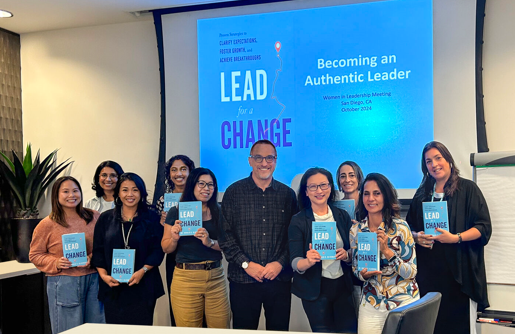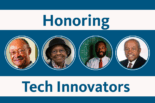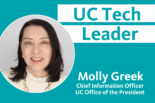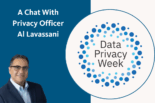Dr. Ron Glickman‘s book “Lead for a Change” (Amazon/Audible) stands out in the crowded leadership literature category with its focus on self-awareness, emotional intelligence development, and psychological aspects of change. He offers a unique blend of psychological depth and actionable strategies that help aspiring and seasoned leaders alike in transforming the tension of cognitive dissonance into the power for personal and organizational change.
On October 4, 2024, with help of Irvine Technology Corporation, Glickman and the Vibrant ERG group at UCSD HEALTH SYSTEM conducted an in-person workshop to teach a group of women leaders the transformation strategies Glickman calls, “Lead for a Change.”
Glickman spent 3 hours with Vibrant ERG members and presented on the topics of: (1) how to become authentic leaders by evaluating our own emotional maturity; and (2) effecting change from within to drive the purposeful outcomes we seek.
Major themes from workshop:
- Being an authentic leader is about having the courage to lead
- Superpower of leadership #1: Emotional intelligence or emotional quotient (EQ)
- Superpower of leadership #2: Self-authoring (process of writing about your life and personality in a detailed and analytical way)
Memorable Quotes
“It’s not our differences that divide us. It’s our inability to recognize, accept, celebrate, and leverage those differences.” – Audrey Lorde
“Sometimes it’s the people who no one imagines anything of… who do the things that no one can imagine.” – Joan Clarke
“Every time you are tempted to react in the same old way, ask yourself if you want to be a prisoner of the past or a pioneer of the future.” – Brené Brown
“Do I have enough information to freak out? The answer is normally no. Will freaking out help? The answer is always no.” – Brené Brown
Key insights and aha moments gained by the group:
The work of change starts with self
Attendees appreciated the focus on personal accountability and how change begins with understanding oneself. They learned that self-awareness is critical for both personal and professional growth. Many found the practical frameworks presented during the session, such as emotional intelligence tools and change curves, useful for both their work and personal lives. Participants expressed interest in using these frameworks regularly to manage change more effectively.
Psychology of Change
There was considerable interest in the psychology of change, particularly how beliefs (even if not factual), perceptions, and behavior patterns impact genuine change. Cognitive dissonance, the tension between existing beliefs and new information, emerged as a topic many wanted to explore further, especially in contexts where people are “stuck” in echo chambers.
An “A-ha” moment was realizing that we often experience multiple change curves simultaneously across different areas of life. This insight highlights hidden or “stealth” stress.
Attendees expressed the need for leaders to lead teams out of the “Valley of Despair” in times of change.
Author

Program Director
UC San Diego Health







